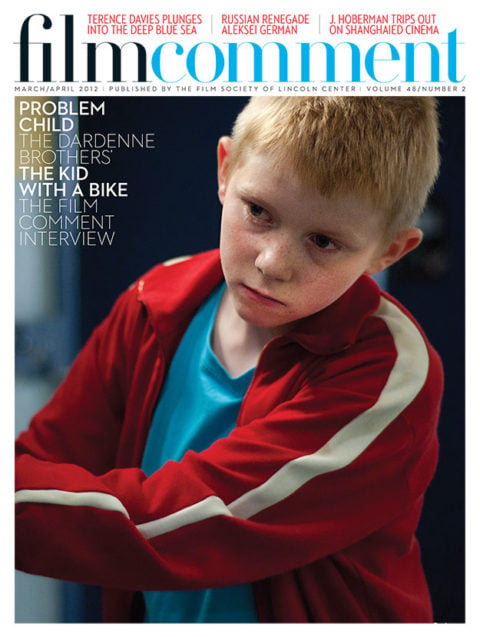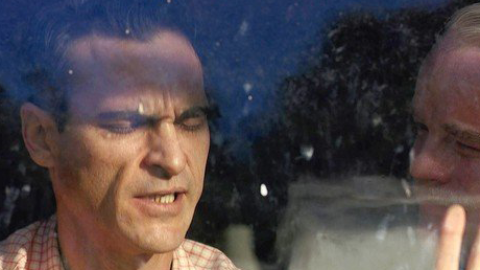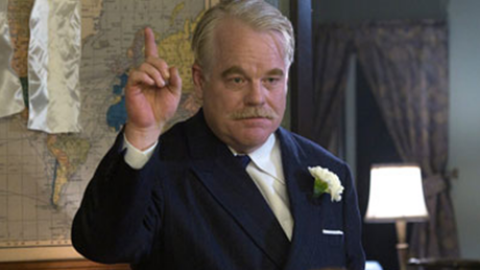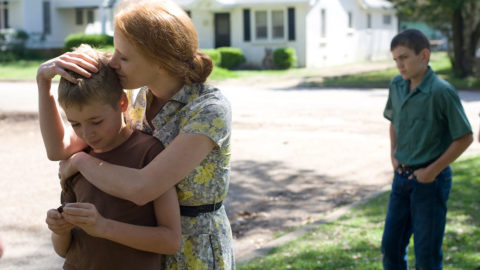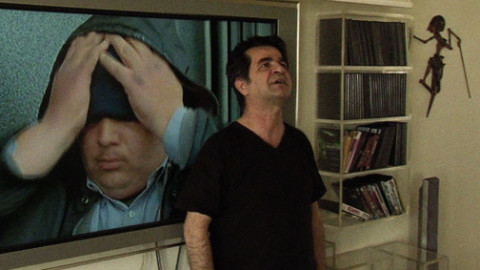The Tree of Life (#1)
The Tree of Life made the top of Film Comment and Sight & Sound’s list, and was the most mentioned film by reviewers around the country. (Three of the top four films on the Film Comment and Sight & Sound lists are the same.) I am left, to the amazement of my friends, unmoved. I have never seen a Terrence Malick film that was not beautiful, and I have never seen a Terrence Malick film that was wholly satisfying. The portrait of the family in The Tree of Life is as lyrical, haunting, and profoundly affecting as anything in recent cinema. Then there’s the cosmos, the dinosaurs, the hereafter. I’m reminded of the Tallulah Bankhead quip: “There’s less here than meets the eye.”—Alfred D. Malmfelt, Philadelphia, PA
I didn’t like The Tree of Life at all the first time I saw it, and feared that Malick’s creative muse had deserted him. But for various reasons I went to see The Tree of Life again and, having adjusted my expectations, I found it fascinating and challenging. I probably saw it five or six times and couldn’t stop thinking about it for weeks—Michael Annand, New Haven, CT
I have never been much of a fan of Terrence Malick but have always had a deep respect for his singular vision as an artist. Both distant and intimate, this movie hit me on an emotional level few films ever have. The conflict between the way of nature (Brad Pitt) and the way of grace (Jessica Chastain) has never so more beautifully been portrayed.—Ryan Bates, Los Angeles, CA
In terms of the boys’ experiences, I’ve never had a film that involved me so personally before.—Jeff Berg, Las Cruces, NM
Melancholia (#2)
I was so moved by the end of Melancholia that I couldn’t speak. At the film’s conclusion, Kirsten Dunst’s depressive character is the only one with the fortitude to meet the end with grace. I know someday I’m going to go, and that’s how I want to do it.—Jeff Jewell, Howell, MI
Everyone hates Lars von Trier, but guess what: he makes amazing movies!—Andy & Jen Gyurisin, Winchester, VA
The opening sequence and a few other shots aside, the cinematography for this movie is absolutely horrid. Sure, there are 15 minutes of epic planet collisions, beautiful shots of two people riding horses under low-lying fog, and people looking moody with a planet imposed in the sky, but most of the movie’s running time is terrible shaky-cam that can’t even keep itself stable on its characters, often shaking off to the walls of a room and refocusing abruptly. Its ugliness is only exaggerated in its useless and pessimistic view of humanity that The Tree of Life refutes far more convincingly than any pseudo-intellectual, shallow arguments that this film makes.—Jacob Shamsian, Great Neck, NY
Lars von Trier has always been one of my favorite directors, but there just wasn’t enough pressure on the main characters for me to care that they were all going to die, which was unfortunate.—Grant Bromley, Knoxville, TN
Drive (#3)
Whenever Drive is brought up, I have a very consistent reaction: my eyes widen, my jaw drops, and I audibly let air out of my mouth for a prolonged period of time. Instead of softening his Danish style for the mainstream, Nicolas Winding Refn managed to smuggle a European art-house film into the multiplexes and slathered it with an impeccable Eighties retro-cool that’s de rigueur these days.—Jon Marquis, Los Angeles, CA
In the tradition of Melville’s Le Samourai, Drive is a film of style and mood rather than action.—Howard Schumann, Vancouver, BC
I have rarely seen a film go from excellent to “what the heck” as fast as Drive. After a brilliant opening sequence with Ryan Gosling driving a couple of thieves to safety by NOT running red lights or screeching tires around corners all under the watchful eyes of the police, we then move into a silly story with Gosling as a stunt car driver by day, but escape artist by night. What is this, Flashdance? And what a waste of Ryan Gosling. One of the most intelligent, articulate and witty actors to come along in years, and he spends most of the film simply grimacing and saying little. Yes, Albert Brooks was good as the bad guy, but overall, Drive left me cold. Another thing: why use an ersatz Tangerine Dream music score when the real Tangerine Dream is still around?—Michael McGonigal, Philadelphia, PA
If one is trying to get a girl “in the mood” on a first date, watch Drive.—Roger Lonak, Chicago, IL
Hugo (#4)
Imagine Jean-Luc Godard’s Histoires du cinéma remade as a Disney film.—Jeffrey Wang, Fullerton, CA
Hugo was a major disappointment. Beginning with Gangs of New York, Scorsese’s movies have been bland to above average. Very sad.—Kevin Kateluzos, Mechanicsburg, PA
If The Artist was Michel Hazanavicius’s grasp for cutesy nostalgia, then Martin Scorsese’s Hugo is a pleading to everyone for preservation.—Andrew Grigriss, Springfield, OH
Midnight in Paris (#5)
I have long been a fan of Woody Allen, and this is his best work in many years. Light and whimsical, it has a great script and one of the best ensembles of the year. Owen Wilson is the best Allen surrogate aside from Allen himself, Marion Cotillard is enchanting, and the small performances by Kathy Bates, Adrien Brody, and Tom Hiddleston are fantastic. But the entire movie is stolen by Corey Stoll as Ernest Hemingway. The monologue he delivers in the carriage to Owen Wilson’s character had me rolling with laughter. I just love this movie. I had a smile on my face the whole time I was watching it.—Evan Coury, New Kensington, PA
Owen Wilson has never been better. Not that that’s saying much, but still.—David Putnam, Parma, OH
It’s great that Allen has such a distinct and idiosyncratic voice, but how many times do we have to hear it? I’ve seen Midnight in Paris praised for being auto-critical of this aspect, and while this is probably true, this reading fails to make the film more interesting.—Alex Jackson, Roy, UT
The Artist (#6)
Most overrated film of the year: The Artist, a silent film for people who think silent filmmaking is just overacting, broad gestures, and title cards. Fifty years from now, people are going to look back in disbelief that a film like this could beat Terrence Malick, Martin Scorsese, Alexander Payne, and Woody Allen all in the same category.
Matt Kelly, Northbrook, IL
The Artist may not be a perfect film, but any silent film that puts asses in seats in 2011 is good enough for me. Besides, it is one of only four films this year (with Le quattro volte, Tabloid, and Midnight In Paris) that caused me to leave the theater with a smile on my face. And that is saying a lot.—Alan Hoffman, Cicero, IL
Certified Copy (#7)
Nothing could stand up to the power of Abbas Kiarostami’s Certified Copy. Every shot, every edit, every line of dialogue (including what language the dialogue has been spoken in!) is a clue to unpacking a mystery with no solution but what we desire to subscribe to it. Juliette Binoche gives a performance of witty humor, deep sorrow, and tender romance. I’ve seen Certified Copy five times now, and each has pointed me in a different direction toward what I think the answers of the cryptic narrative might be.—Peter Labuza, New York, NY
The Descendants (#8)
The Descendants expertly twisted together a fine dramatic story with bits of humor and supplemented it with great performances, non-clichéd looks at Hawaii, and a soft music score to make it one of the best of the year. —Jeff Berg, Las Cruces, NM
A few things, namely George Clooney and Shailene Woodley, saved this from being a completely ludicrous melodrama.—David Putnam, Parma, OH
Meek’s Cutoff (#9)
In her sparse and quiet fashion, Kelly Reichardt radically reimagines the Western and the manifest destiny narrative. Meek’s Cutoff is a uniquely feminist revision of America’s most macho keepsake, a film recognizing the barren unknown of a new frontier for what it is and not the adventurous playground we’ve come to expect.—Joaquin Villalobos, Denver, CO
A Separation (#10)
Exhausting, brutally honest Iranian drama that raises complex moral questions into the human condition. I was completely absorbed in this story of desperate, prideful characters who desperately want to break free but can’t seem to escape the shackles of their own environment. This is progressive filmmaking at its best.—Ryan Bates, Los Angeles, CA
A Dangerous Method (#11)
Some critics have acted incredulous that Cronenberg, who gave us exploding heads and human VCRs in the Eighties, would opt for such a “classical” approach to this material. But I found this to be a surprisingly witty, genuinely erotic (and not just because of the spankings) and, yes, intensely cinematic experience. Keira Knightley’s brave performance came in for criticism in some quarters for being “mannered” but I think she’s the heart of the film; I can’t imagine a better physical embodiment of Cronenberg’s central idea of sexuality as a disruptive force.—Mike Smith, Chicago, IL
Tinker Tailor Soldier Spy (#12)
This film is the very definition of tedious. It’s a spy thriller with no thrills. I challenge you to explain to me how Smiley figured it out. Also, the film is dull and dingy to look at. It’s full of rainy, foggy weather, as if it were illegal for the sun to shine in London before 1979. The only real surprise this film offers will be finding the odd audience member who’s still awake when the final credits roll.—Michael McGonigal, Philadelphia, PA
I love it when a filmmaker just trusts you to keep up. I always felt about one step behind while watching Tinker Tailor, but after a while that seemed so deliberate, I really started to enjoy the process. It all fit together eventually, and it felt richer because I had done so much of the work myself. I saw A Dangerous Method about a week later, and while I liked it, I couldn’t help feeling insulted by the title cards that popped up every five minutes.—Jeff Jewell, Howell, MI
Excellent set design and cinematography, but Oldman’s ultramannered (very valid) acting style meshed badly with the very naturalistic styles of Colin Firth, Tom Hardy, Benedict Cumberbatch, John Hurt. Furthermore, Smiley was placed a few keys too low, he was too understated to be engaging, too unfathomable for us to make reasonably educated guesses on what he was thinking.—Jacob Shamsian, Great Neck, NY
Shame (#13)
Shame should have been a great movie. After Hunger, Steve McQueen was poised as a promising director. But Shame is a wolf in sheep’s clothing, exploitation masquerading as art house. The point of view is an adolescent’s romantic take on addiction: why am I so tortured by my spiraling-out-of-control high-life that compels me to fuck models and, in a pinch, men? It must have something to do with my relationship with my slutty suicidal sister and my inability to connect with people who love me… Insufferable film-school aesthetics and a bombastic classical soundtrack are the icing on this unsavory cake. The acting is its saving grace, particularly by the brave Michael Fassbender who can make the most execrable movie watchable.—Alan Hoffman, Cicero, IL
Like a date night movie from hell, Shame proved to be a nice bracing alternative to the usual holiday cheer. A stunningly crafted film that makes me want to see Hunger.—Tim Kabara, Baltimore, MD
Uncle Boonmee Who Can Recall His Past Lives (#14)
Apichatpong Weerasethakul’s metaphysical gem uses the exploration of a dying man’s memories as a metaphor for a modern day Thailand that is both transfixed by its fascinating past and anxious about its uncertain future. It’s a shame that so many people have reduced the film to a series of bizarre encounters involving strange characters. Mr. Apichatpong deserves better than that.—Juan Olmos, Houston, TX
The Girl with the Dragon Tattoo (#20)
Fincher knows how to take a mega-franchise and, in the case of Alien 3 and this adaptation, turn it into a bleakly nihilistic experience. It is often viscerally darker and more vicious than its literary counterpart ever got. What works best is the pacing and mood, which is completely a team effort of Steven Zaillian’s script, Trent Reznor’s score, an expert cast, and the Oscar-winning editing team of Kirk Baxter and Angus Wall. Rooney Mara stuns you with her expansion of Lisbeth as a complex antihero you feel for from frame one.—Todd Sokolove, New York, NY
Poetry (#21)
For most of the running time I forgot I was watching a finely wrought morality play, until the final scenes when the cumulative force of the previous two-plus hours hit me like a ton of emotional bricks.—Mike Smith, Chicago, IL
Beginners (#22)
Unpretentious and unclichéd, Ewan McGregor and Christopher Plummer created a realistic father-and-son relationship that is very poignant. It was everything you want in a film, but unfortunately, what you can’t get in most films.—David Hollingsworth, Fayetteville, NC
Cave of Forgotten Dreams (#23)
Come on, man. Is Cave of Forgotten Dreams really as good as Aguirre: The Wrath of God or Stroszek or Even Dwarfs Start Small? Would anybody claim it was better? There’s enough magic in that strange coda with the albino alligator and the clip of Fred Astaire to make it worth a mild recommendation, but 50 years from now this isn’t going to be Herzog film most people will be watching. I can’t be the only person who has been saying this. This overpraise reminds me of Pauline Kael’s complaint in “Circles and Squares” that saying Journey to the Lost City is great implicitly devalues M and Metropolis.—Alex Jackson, Roy, UT
Contagion (#28)
In Contagion Steven Soderbergh brings us a more fully realized and successful version of Traffic, and inadvertently the most horrifying film of the year. Kate Winslet not making it through that cold dark night was the single most emotionally affecting scene I’d seen all year. It’s a grim reminder that it’s not the “if” but the “when.”—Brett Scieszka, Brooklyn, NY
Weekend (#30)
One of the best films about my generation’s inability to handle love and our emotions.—Matthew Williams, Cincinnati, OH
As a straight man, I have always had trouble connecting to homosexual characters in movies. But Weekend is really special. It is a great depiction of authentic love between two people. Both performances are so different, but fit together so well. The script is great and the dialogue is realistic. It is a tremendous film that everyone can connect to because it is about love.—Evan Coury, New Kensington, PA
The feel-good stoner film of the year that is just militant and British enough not to scare off us straights.—Roger Lonak, Chicago, IL
Young Adult (#44)
Second time’s a charm for this Diablo Cody and Jason Reitman team-up, probably more so than Juno. Here it’s Jason Reitman’s direction that firmly establishes him as a modern-day Mike Nichols. Charlize Theron is brilliant as Mavis, and her comedy-of-errors antics make up for the films our generation only dreamed John Hughes would make after the Eightiess. It’s a movie that won’t work for everyone, but for Generation X, it’s easily the most relatable film since Grosse Point Blank.—Todd Sokolove, New York, NY
The Future (#45)
Miranda July is the real deal. She has too often been mixed in with the annoying Indie filmmakers who make boring realist movies about friends and money and “stuff,” when in fact she is achieving something much deeper, more sincere.—Jacob Shamsian, Great Neck, NY
Pariah
Everything that Precious was, but better.—Ryan Bates, Los Angeles, CA
Fright Night
Fright Night delivers on what Super 8 just touched upon: it perfectly encapsulates what it feels like to be a horny teenager. It’s just pulsating with sexual energy. The guy living next door alone is a vampire who’s banging that exotic dancer you’ve been fantasizing about since you were 12. Your best friend is trying to tell you, but you’ve dumped him because you’ve moved on to a higher social strata and have a hot girlfriend. So this bloodsucking vampire is an aspirational figure. Just brilliant. This is virtually the perfect vampire movie!—Alex Jackson, Roy, UT
Insidious
James Wan begins to redeem himself for creating Saw.—David Hurwitz, San Diego, CA
Submarine
The best coming of age film since Rushmore. Yes, it’s quirky, but it’s not twee. Sorry, Decemberists and Zooey Deschanel fans!—J.W. Von Werner, Simms, MT
Submarine is a sweet and funny film that, unlike many Hollywood teen comedies, is not afraid to mix genuine emotions with its humor.—Howard Schumann, Vancouver, Canada
Potiche
Why the consistent lack of love for the always underrated Ozon? Potiche was another charming, cinematically informed ode to woman power by Ozon. The mood is one of semi-meta-bourgeois farce. But in its gentle way, this film is finely—and seriously—attuned to the failures of male-driven capitalism.—Lawrence Frascella, Irvington, NY
Larry Crowne
Even I was surprised when I put Larry Crowne on my list. It is far from a perfect movie, but the themes in this film are important. Many films address the economy and our consumer-based society; few films offer answers. For me, Larry Crowne sparked more conversations about American society than any other film this year.—Jeremy Maron, Sacramento, CA
General Comments
In a year in which veteran directors whom I have consistently respected turned out work that I loathed (The Tree of Life and Hugo were two of 2011’s worst movies) or that couldn’t even get me to the theater (Almodóvar, Cronenberg, von Trier), I was very happy to see veterans like Herzog, Weir, and Breillat turn out work that kept them on their toes. It is particularly moving to see amazing film, books, and public appearances from Breillat under extreme physical limitations, about which she has written most eloquently.—Rob Schmieder, Boston, MA
On the whole, 2011 was an almost unbearable year for films. I found it challenging to compile at top-five list, much less a top-ten list, The pickins were slim, with only four or five truly great films that were released last year. Most of the films that have been dominating the award shows lately are wildly overrated exercises in sentimentality, nostalgia, and blatant manipulation: War Horse, The Help, Hugo, and The Artist.—Avi Sloan, West Hartford, CT
Three enemies of American cinema: to start with, the Sundance formula and the studio formula. It’s time to for American filmmakers to hit the refresh button. The third enemy is what we laughingly call “the American film criticism establishment.” We need a thorough examination of the history of American film criticism as well as a guiding set of principles for moving forward. The critics are the enemy of independent and daring cinema at a time when they are the most vital friends that independent filmmakers could have. Political correctness and stupid newspaper and magazine editors have gotten everyone terrified and running for cover, focused on the dumbing down, terrified of the “what if I focus on someone new saying something in a new way?” I can say that. I’m a newspaper editor!—Steven Gaydos, Los Angeles, CA
With the exception of the Mighty Malick, a lot of the American indie up-and-comers (Jeff Nichols, Kelly Reichardt, Azazel Jacobs, Sean Durkin, Mike Mills, among others) were often doing more interesting things than the American old guard auteurs (Scorsese, Allen, I suppose we can even include Payne and Fincher here too). This bodes well for the future of American filmmaking, even as we lament the death of 35mm film.—Adam Ball, Oakland, CA
It was a phenomenal year for foreign films, but not so much for American productions. I can’t complain about a year that had an abundance of great movies like Poetry, Uncle Boonmee, Certified Copy, Mysteries of Lisbon, and A Separation, not to mention several that don’t officially open until 2012: The Kid with a Bike, The Turin Horse, etc.—Mitchell Wu, Brooklyn, NY



